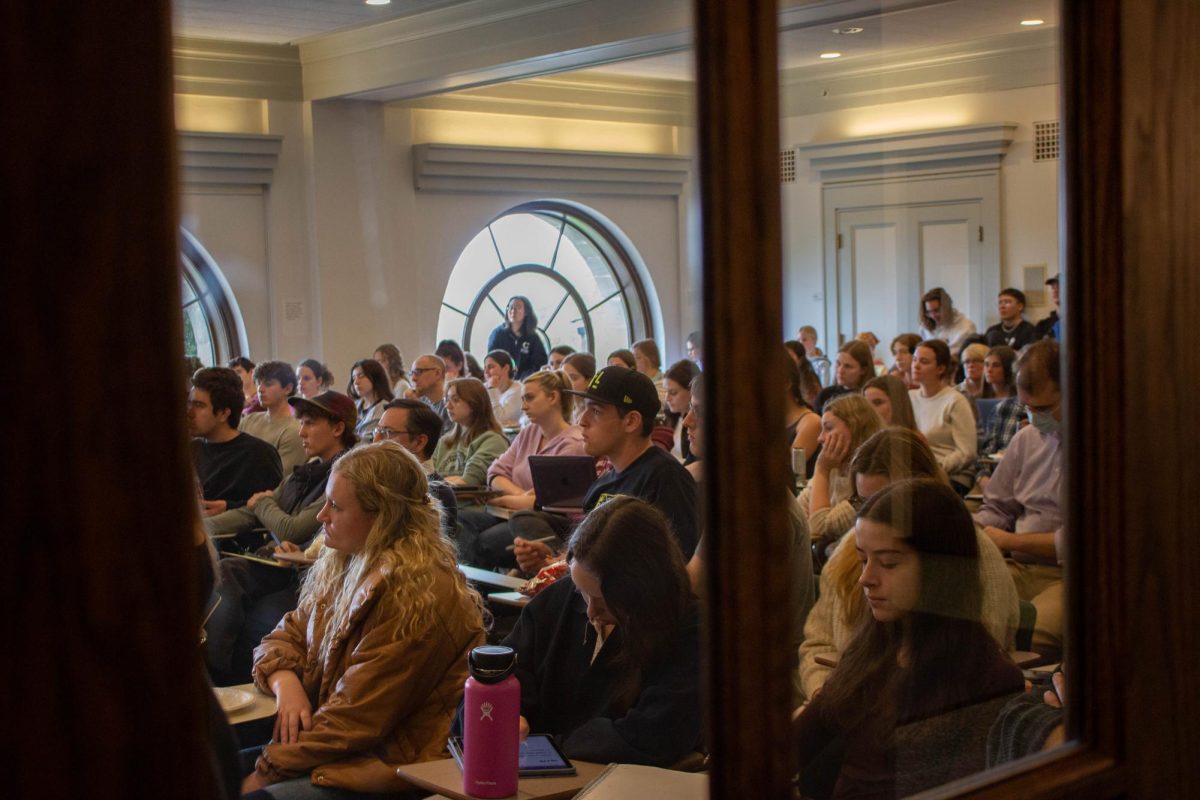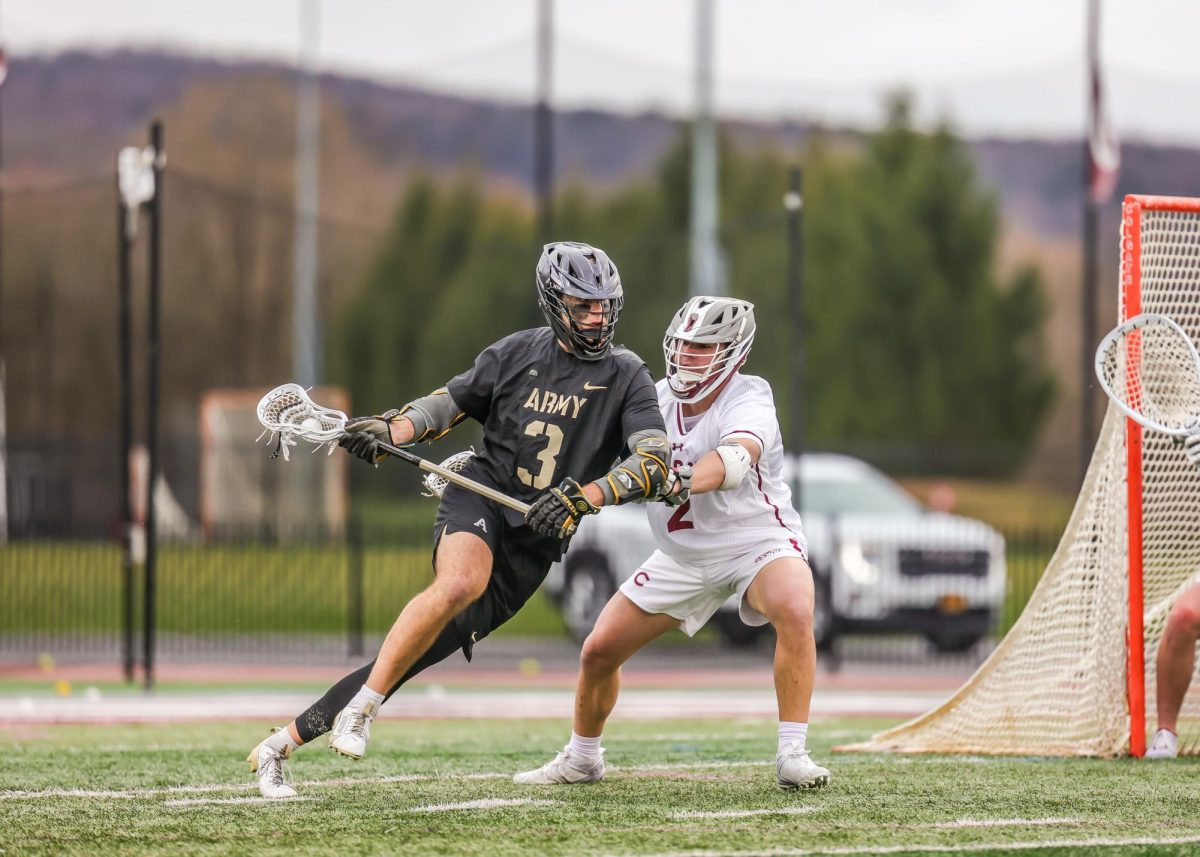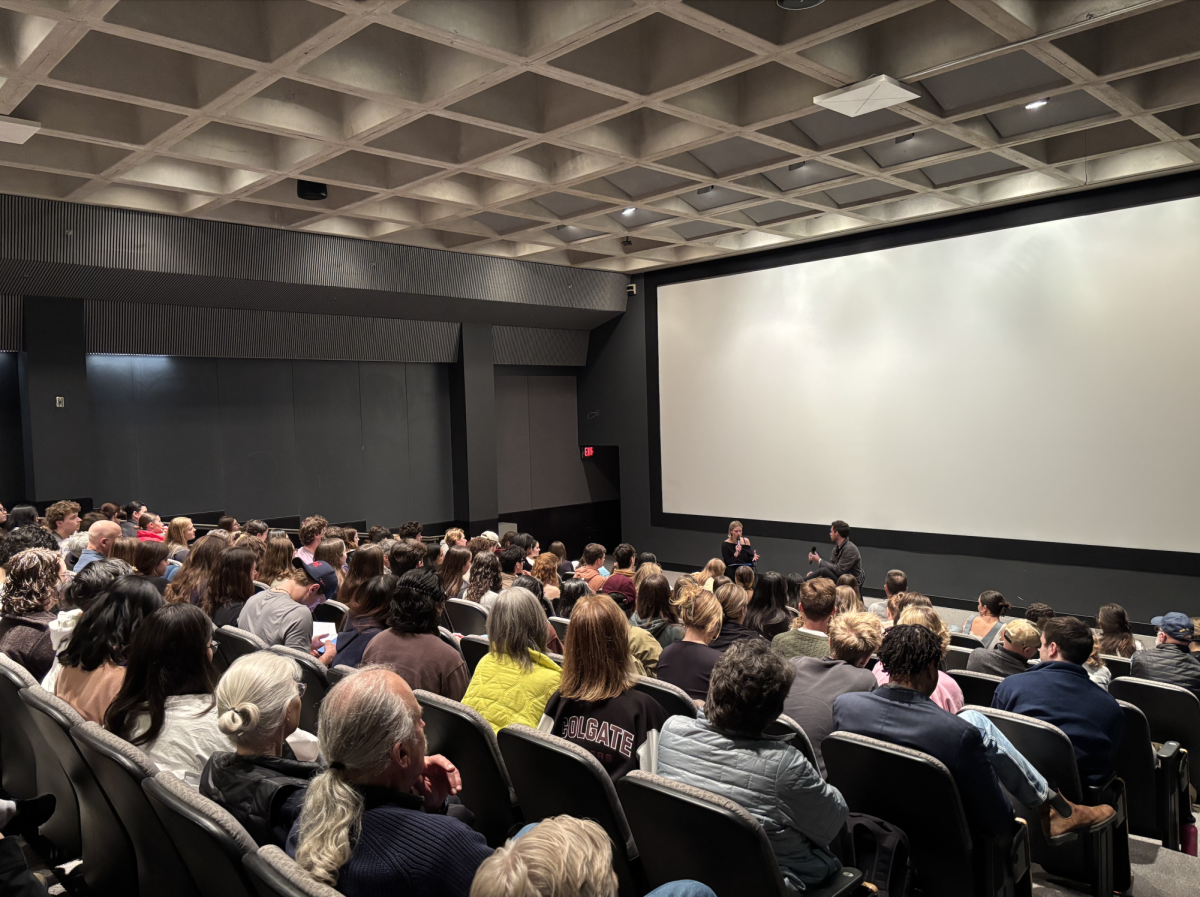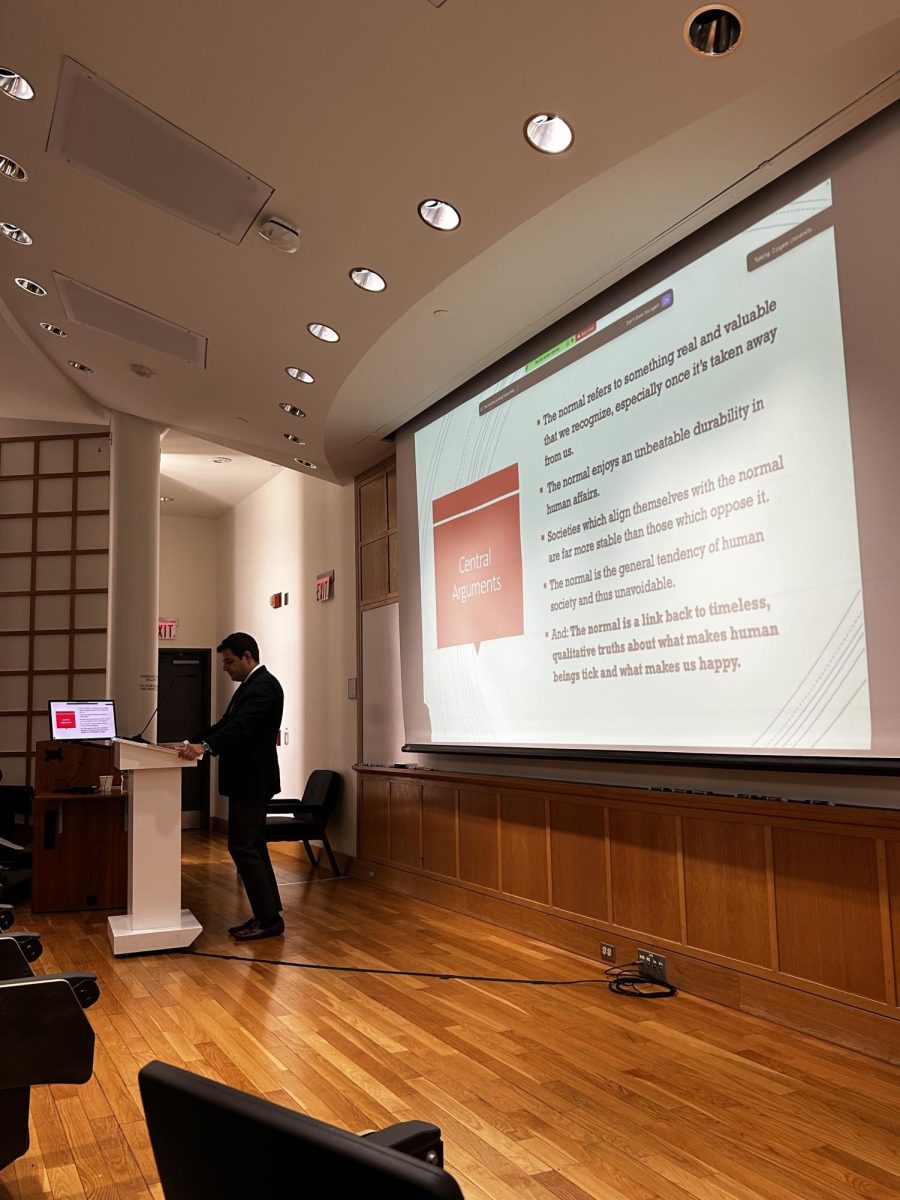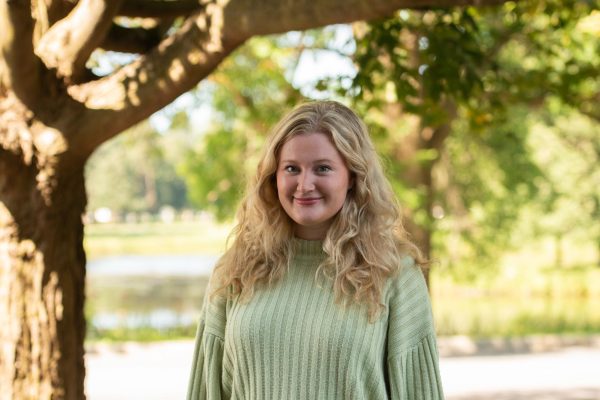Following Hamas’ attacks on Israel on Saturday, Oct. 7, the Jewish Studies Program, the Office of the Provost and Dean of the Faculty and the Center for Freedom and Western Civilization sponsored a special lecture titled “The War in Gaza: A Briefing” on Thursday, Oct. 12. The lecture featured Yossi Klein Halevi, a senior fellow at the Shalom Hartman Institute in Jerusalem and a published author. Klein Halevi gave students insight into the Israeli perspective on recent events and the complex history of the Israeli-Palestinian conflict.
Klein Halevi began the lecture by explaining to students that he speaks from an Israeli perspective.
“Thank you for the opportunity to share with you all something of what we’re going through here in Israel. I’ll be speaking from an Israeli perspective, and I think that’s important to say. Palestinians are going through their own trauma at the moment, especially innocent civilians in Gaza,” Klein Halevi said. “What I’d like to do is really try to unpack for you something of the emotional, psychological and political and military of what this moment means for us Israelis.”
Klein Halevi discussed the turbulent political climate in Israel over the past year surrounding judicial reform. According to Klein Halevi, the country was divided between pro-government and pro-democracy camps. Klein Halevi noted the impact of the recent attacks on this bitter national divide.
“The only silver lining is that it’s restored to us a sense of commonality, a reminder why Jews are in Israel, why Israel means so much to the Jewish people and why so many of us have fought for Israel. We’re ready, if necessary, to give our lives for Israel. And that’s a very common sentiment and experience among Israelis,” Klein Halevi said.
Klein Halevi discussed the tragedy that ensued and what aspects were especially shocking to Israelis.
“What made the events of this last week so stunning was not just the horrific nature of the atrocities. This wasn’t just collateral damage of civilians in war. This was a systematic massacre of 1,300 people,” Klein Halevi said.
Klein Halevi spoke about the lack of military presence and feelings of helplessness Israelis experienced.
“The fact that the army was so ineffective in saving 1,300 Jews, the fact that the border was left wide open, [that] the army wasn’t present – this is what was so hard for us, more than anything else,” Klein Halevi said. “Even more painful than the mourning is the fact they died helpless.”
Klein Halevi also spoke about Hamas’ mindset and why they are a threat to Israeli lives.
“For Hamas, there is no difference between Tel Aviv and a West Bank settlement. It’s all occupied Palestine. There is no legitimate Jewish majority state in any borders, and so any Jew is a settler, and any settler is a legitimate target. And therefore, Hamas did not kill innocents. When it killed babies, it killed future soldiers. It killed future occupiers. So, for Hamas, there are no Israeli innocents and there is no legitimate country called Israel,” Klein Halevi said.
Klein Halevi transitioned into discussing the Palestine occupation. Klein Halevi personally does not agree with the occupation of parts of Palestine, but discussed some of the fears in giving the land back from an Israeli perspective.
“First of all, [the occupation] is a disaster for Israel. A moral disaster, a political disaster, a demographic disaster. I see the occupation as a long-term threat to Israel’s existence,” Klein Halevi said. “But what terrorism – and this event in particular this week – reinforces in the Israeli psyche is the fear that if we leave the West Bank, what exists in Gaza will be repeated there. And we will have another Gaza-like state, but this time five minutes away from Tel Aviv and Jerusalem. So Israelis say, ‘If I give up the West Bank will I get peace in return, or will I get more terrorism?’”
Klein Halevi also discussed the recent history of the Palestine-Israel conflict and failed peace initiatives. He particularly highlighted the Clinton Parameters in 2000, where Israeli Prime Minister Ehud Barak and Palestinian Authority chairman Yasser Arafat met with United States President Bill Clinton to negotiate peace. Arafat rejected the proposals, which led to a four-year war called the Second Intifada.
“So if you ask Israelis today, ‘why don’t you sit down and negotiate peace,’ most Israelis will point to the year 2000 and say, ‘we tried and this is what we got back in return,’” Klein Halevi said.
Klein Halevi also discussed several other peace initiatives, the last of which was in 2009. Klein Halevi thinks Israel should continue to try to orchestrate peace agreements regardless. However, while these attempts should be continued, Klein Halevi does not think Palestine wants a two-state agreement.
“I don’t believe the Palestinian national leadership is ready to accept the legitimacy of the Jewish people’s return home, and, instead, continues to see our return home not as a re-indigenizing of a rooted people but as a colonialist western invasion,” Klein Halevi said.
Klein Halevi spoke about what these recent developments mean for Israel.
“The overwhelming consensus in Israel today – and I’d say this ranges from left, to center, to right – is that the Hamas regime must be destroyed,” Klein Halevi said. “This time, we are in an all-out war. That’s the real meaning of what happened Saturday. Saturday was a declaration of genocidal war against Israel.”
Klein Halevi noted that the conflict is a regional one and hopes that peace throughout the region will emerge after the war.
“My hope is that what will emerge is an Arab-Israeli peace front which will include the Gulf States, Egypt, Jordan and Israel, and that together we will figure out how to create a Palestinian state that will not be a security threat to Israel.”
Klein Halevi closed his lecture with a statement of warning and hope for the future.
“The coming months are going to be brutal – I would say the worst in Israel’s history, and the worst in Palestinian history. Maybe the worst times for the Middle East. But I also see the possibilities of finally finding an alternative to what has seemed to be an insoluble problem for many decades,” Klein Halevi said.
Junior Georgette Manos attended the lecture and found it interesting to hear about the conflict from an Israeli perspective.
“I found the lecture to be very informative, and I appreciated that Klein Halevi was up front about his perspective as an Israeli approaching the conflict. I think it was really important to have the opportunity to hear from him, especially because he is someone who has been living in Israel since 1982 and has seen the country through a lot of its recent history,” Manos said. “Overall, having speakers from all perspectives discuss current issues helps educate the student body as well as provide a healthy space to learn for all.”
Professor of World Religion and Jewish Studies Steven Kepnes explained the intent behind inviting Klein Halevi to speak.
“Yossi Klein Halevi is one of Israel’s leading commentators on the Arab-Israeli conflict. He is both a journalist and book writer who has important books on the Israeli Wars and on Palestinian-Israeli dialogue, which he is very involved in. I find him fair, knowledgeable and articulate, and he also knows the American university world very well,” Kepnes said.
Kepnes thinks it is important for Colgate University to offer discussions about world events like this one.
“It is important at times of crisis in the world for the University to provide educational material and deeper insight than one gets in quick sound bites or short TV reports. We have a responsibility to show the larger context of events, the history and the implications for the broader world as well as the U.S.,” Kepnes said.
Kepnes discussed what he hopes students will take away from this lecture.
“I think that what I want students to have taken away from the talk is a broader understanding of the Arab-Israeli and Palestinian-Israeli conflicts and knowledge that it is not a simple matter of ‘good’ and ‘bad’ guys, as Klein Halevi said. Your job as students is not to demonize one side or the other. This is a complex issue with a long history and neither side is totally pure. One can condemn Hamas for its terror tactics without saying all Palestinians are terrorists,” Kepnes said.


